Finding the right furry companion can seem daunting for those with dog allergies. You want to welcome a fun, affectionate pup into your home but don’t want to sneeze and wheeze daily. This dilemma often leads allergy sufferers to seek out hypoallergenic dog breeds that are less likely to trigger allergic reactions. One adorable option that frequently tops the hypoallergenic list is the Bichon Frise. But what exactly makes this curly-haired cutie so allergy-friendly?
In this comprehensive guide, we’ll explore the ins and outs of Bichon Frise allergens, examine how their immune systems contribute to their hypoallergenic nature, debunk common myths, provide grooming tips for allergy sufferers, and discuss alternative breeds if Bichon Frises don’t cut it. Let’s dig in!
Table of Contents
- 1 Getting to Know Bichon Frise Allergens
- 2 The Role of the Bichon Frise Immune System
- 3 Debunking Common Myths About Bichon Frise Allergies
- 4 Expert Grooming Tips for Bichon Frise Owners With Allergies
- 5 Hypoallergenic Alternatives to the Bichon Frise
- 6 The Bottom Line
- 7 Related posts:
- 8 Bichon Frisé: All You Need to Know
- 9 Ultimate Guide to Raising Bichon Frise Puppies
- 10 Bichon Frise Rehoming: Find Your Perfect Companion Today!
- 11 Understanding Bichon Frise Behavior: A Comprehensive Guide
Getting to Know Bichon Frise Allergens
To understand why Bichon Frises causes fewer allergic reactions, we must first examine the source of allergens in dogs. Most breeds’ primary offenders are proteins found in their dander (skin flakes), saliva, and urine. When allergy sufferers come in contact with these substances, their immune systems overreact and trigger symptoms such as sneezing, coughing, and watery eyes.

Bichon Frises have a hypoallergenic reputation mainly because of their unique white coat. Unlike many dogs with double coats, Bichon Frises have a single layer of curly, dense hair that resembles human hair. This hair does not shed significantly, which means less dander and allergens circulating in the environment. Their skin also produces fewer substances that cause allergic reactions in people.
While no dog is entirely non-allergenic, Bichon Frise allergens primarily stem from their saliva and skin secretions rather than their hair and dander. Their hair also takes longer to shed than fur, keeping loose hairs from becoming airborne allergens as quickly. These qualities mean that allergens linger on Bichon Frise’s hair rather than shedding into the air, furniture, and carpets.
Of course, regular grooming and bathing play a pivotal role in managing allergens. Frequent brushing removes dander and other allergens trapped in the Bichon’s hair before they can be released into your home. Bathing washes away saliva and skin proteins that cause reactions. Keeping hair trimmed short prevents it from picking up and accumulating environmental allergens like pollen.

While Bichon Frise’s hair doesn’t shed much, no dog’s hair is 100% non-allergenic. But their unique curly coats certainly give them an advantage when minimizing allergens for sensitive owners!
The Role of the Bichon Frise Immune System
A dog’s genetic makeup plays a significant role in determining how allergenic they will be. Bichon Frises won the genetic lottery when it comes to hypoallergenic traits. Their immune systems produce lower levels of the allergy-triggering proteins in other breeds’ skin, saliva, and urine. But why is this the case?
Part of the reason traces back to the Bichon Frise’s early history. The breed’s origins can be traced back to the Barbary Coast, where Spanish sailors favored their ancestors for their affectionate nature and hypoallergenic qualities. Being confined to ships for months, these proto-Bichon Frises evolved to have less irritating dander and allergens, allowing them to live in close quarters with sailors safely.
Selective breeding over the centuries further honed the Bichon Frise for preferred traits like a non-shedding coat. Their genetics adapted in ways that led to a less allergenic makeup overall. While the exact mechanisms behind their hypoallergenic biochemistry are still being researched, it’s clear their systems produce fewer problematic proteins.
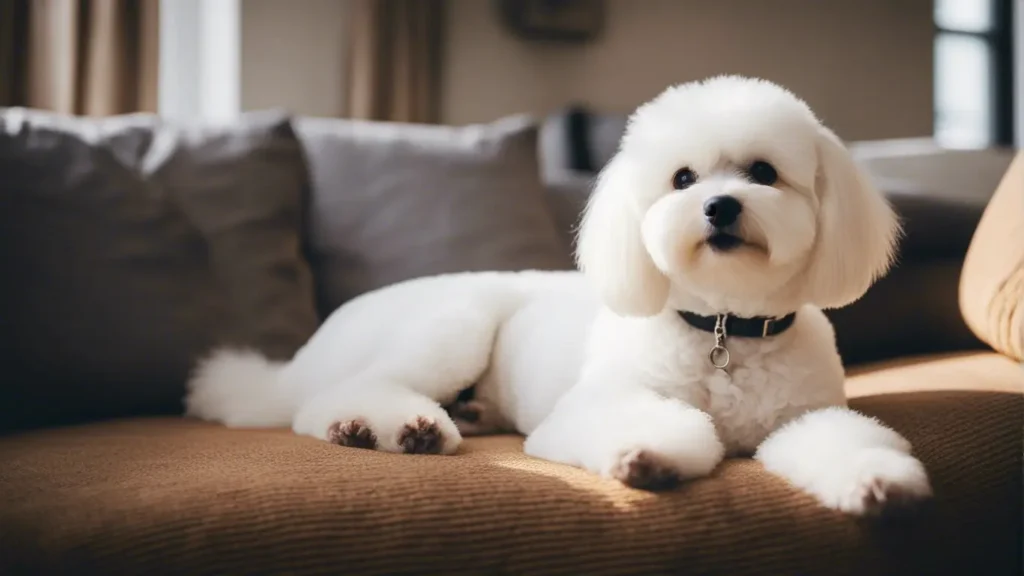
Of course, the degree to which an individual reacts to Bichon Frise allergens depends on their sensitivities and immune function. Those with overactive immune systems and multiple dog allergies are more likely to respond firmly even to the relatively low allergens of the breed. Mildly allergic people may experience no issues living with a Bichon Frise.
Working closely with an allergist can help identify your sensitivity levels through testing. From there, your allergist can recommend personalized management strategies to make life with a Bichon Frise more comfortable and worry-free.
Debunking Common Myths About Bichon Frise Allergies
Despite their hypoallergenic reputation, some misconceptions about Bichon Frise allergies still prevail. Let’s explore a few of the most common myths.
Myth #1: Bichon Frises are entirely non-allergenic.
This is false – no dog is 100% hypoallergenic. Bichon Frises produce lower levels of allergens, but sensitive individuals may still react to saliva, dander, and urine. Spending time around Bichon Frises before committing is advised if you have allergies.
Myth #2: Allergic reactions to Bichon Frises are mild.
How strongly someone reacts depends on individual allergy sensitivity levels. While less allergenic than many breeds, some people may still have significant allergic responses to Bichon Frises. Severity varies on a case-by-case basis.
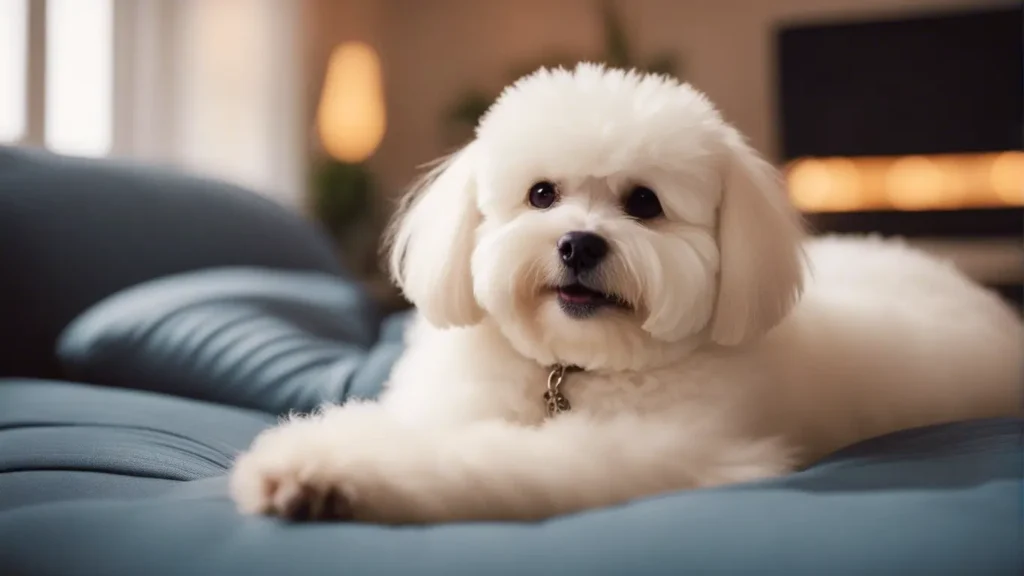
Myth #3: Bichon Frise puppies are less allergenic than adults.
Bichon Frise allergens come from their saliva, skin secretions, and urine. Since puppies produce these substances just like adult dogs, their allergen levels are comparable from a young age. Waiting for a puppy to grow up will not make it hypoallergenic.
Myth #4: Bichon Frise mixes will be hypoallergenic.
Since mixes inherit a blend of traits from each parent breed, there are no guarantees a Bichon cross will have reduced allergens. Some mixes may shed more than a purebred Bichon Frise. Meet the puppy first before deciding.
The reality is that no dog is perfect for those with allergies. But the Bichon Frise’s low-shedding coat, skin secretions, and dander do make them one of the most compatible choices for sensitive owners. Working closely with your allergist and breeder helps ensure your experience aligns with this ideal.
Expert Grooming Tips for Bichon Frise Owners With Allergies
While their genetics give Bichon Frises an advantage regarding allergens, proper grooming is still essential for managing symptoms. Here are some pro tips for keeping your Bichon Frise’s coat and your home as allergy-friendly as possible:
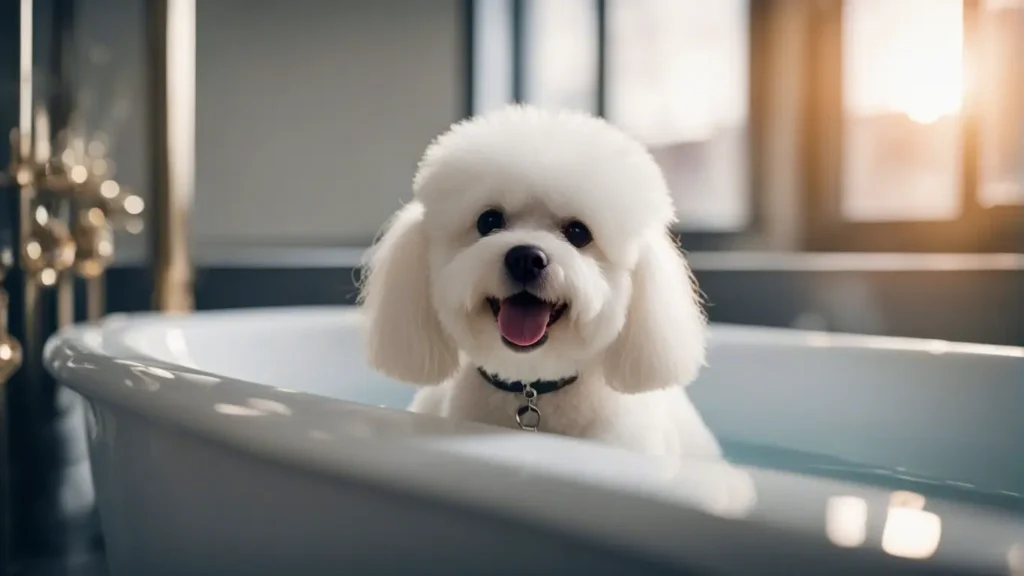
- Brush thoroughly at least twice weekly to remove dead hair and distribute skin oils evenly along the coat. Slicker brushes work best for removing tangles and capturing shed hair.
- Bathe every 3 to 4 weeks with a veterinarian-recommended hypoallergenic shampoo. Allow 10-15 minutes of contact time for shampoo to break down allergens before rinsing thoroughly.
- Schedule professional grooming every 6 to 8 weeks to trim the coat short. Keeping ends neatly trimmed prevents matted fur and overgrowth, which can trap allergens.
- Vacuum twice weekly with a HEPA filter to remove allergens from carpets and upholstery. Dust frequently using damp cloths that trap allergens rather than dispersing them into the air.
- Consider using an air purifier with a HEPA filter to remove pet dander, pollen, and other indoor allergens.
- Bathe your Bichon Frise after visits to grassy areas where pollen and environmental allergens may accumulate in the outer coat.
- Feed a high-quality diet rich in Omega-3 fatty acids, which promotes healthy skin and coat. Consider an allergy-friendly formula.
With diligence and care, living happily with a Bichon Frise is possible even if you have pet allergies. But consistent grooming is vital to continued comfort!
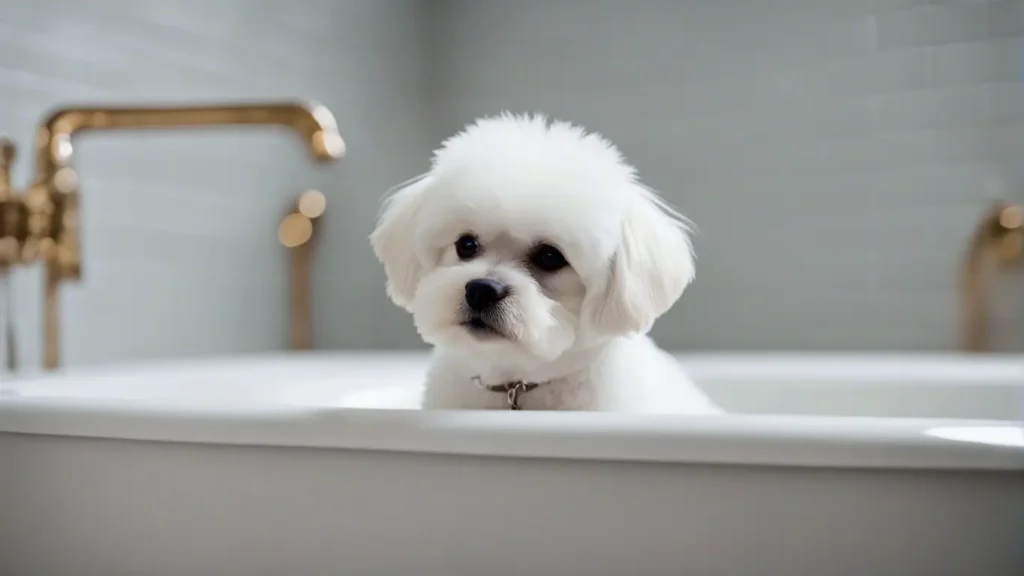
Hypoallergenic Alternatives to the Bichon Frise
While Bichon Frises make excellent companions for allergy sufferers, they aren’t the right match for everyone. Allergies can also develop over time. If you find your Bichon Frise still doesn’t quite meet your needs allergy-wise, consider these popular breed alternatives:
Poodles – Poodles have tightly curled coats more akin to human hair than fur. They are light shedders and produce minimal dander, making them an excellent choice for those with allergies. Just be prepared for their active, intelligent nature!
Maltese – This ancient breed has a long, silky coat that requires significant grooming but is less allergenic than most dogs. Their small size also means lower production of allergens overall. They make affectionate lap dogs.
Schnauzers – Schnauzers are lower shedding with wiry coats that do not trap as much dander and allergens. Opt for a Miniature Schnauzer if the larger Standard Schnauzer size is too much dog for your home.
Portuguese Water Dog – A single-coated, non-shedding breed, Porties make energetic, loving family pets. Their coat needs thorough brushing but produces minimal dander. President Obama’s family chose a Portie for this reason!
Soft-Coated Wheaten Terrier – Despite having a longer coat, Wheatens shed minimally and tend to be better tolerated by those with allergies. Their bouncy, fun-loving nature makes them a pet parent pleaser.
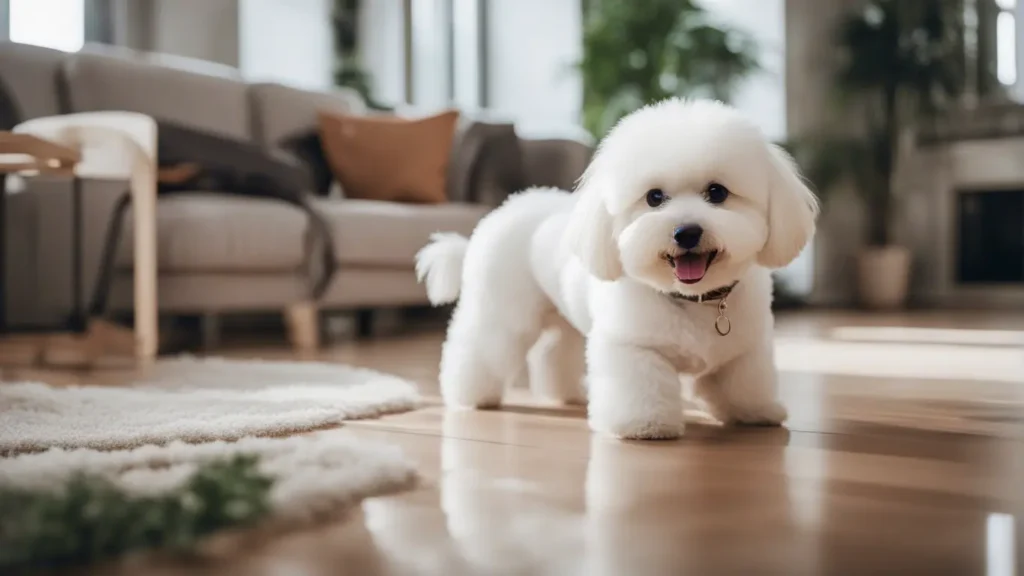
As always, spend ample time around any potential breed to see how your allergies respond before fully committing. Consulting your allergist can also help guide you to the best breed for your sensitivities and lifestyle. Don’t give up on dog ownership just yet!
The Bottom Line
For allergy sufferers longing for an energetic canine companion, the Bichon Frise deserves its status as a top choice. Their unique coats, genetics, immune function, and overall biochemistry create a loving dog with lower allergenic potential. While no dog is genuinely 100% hypoallergenic, Bichon Frises come close.
Of course, individual sensitivity levels still vary. Spending time with Bichon Frises, adhering to strict grooming regimens, working with your allergist, and managing your home environment is pivotal in building a lasting human-canine relationship. With knowledge, commitment, and proactive care, you and your new Bichon Frise can enjoy many sneeze-free years together. Woof!